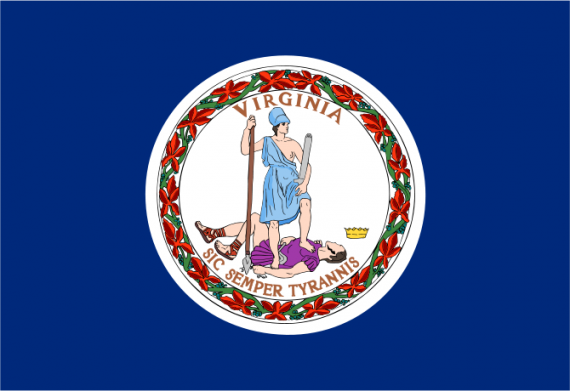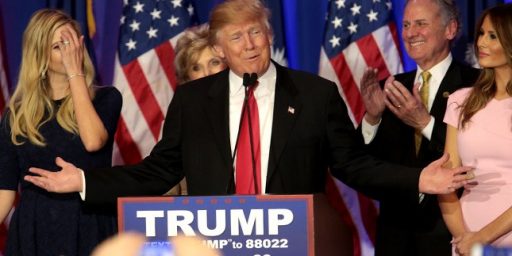A Democracy Fail In Virginia
The vast majority of the seats in the Virginia legislature will not even be contested this November.
This November Virginia will have off-year elections for the state legislature and, bizarrely, only 15% of the seats in the House Of Delegates (Virginia’s equalivalent tot he House of Representatives) will be contested:
I was taken aback when I saw THIS list from VPAP outlining the contested elections in the House of Delegates for 2011. I was stunned. Of the 100 seats in the House of Delegates, ONLY FIFTEEN WILL BE CONTESTED BETWEEN A REPUBLICAN AND A DEMOCRAT. That is an astounding 15% COMPETITION RATE. Wow.
For the record, here are the districts: 9, 10, 13, 19, 20, 31, 34, 36, 37, 42, 52, 59, 64, 75, and 87.
As a comparison, there will be 17 competative state senate seats out of 40, at a clip of 42% competition rate.
This is pretty atrocious. If 85% of the seats in the legislative house that is supposed to be more closely tied to the popular will aren’t even going to be contested, then one wonders what the point of even having elections is. It’s bad enough when even a year of monumental change in the national legislature still results in more than 85% of incumbents being re-elected, but when that same percentage aren’t even going to have to worry about facing an opponent on Election Day, it’s a pretty sad indictment of the system.
There are, I think, several reasons for this, some of which may be unique to Virginia. Redistricting in Virginia is still a political process and, this year, the state legislature redistricting seemed designed to protect as many incumbents as possible. This same is true of the Congressional redistricting, but we haven’t gotten a final map on that yet because of disputes between the Governor and the Legislature. Creating politically safe districts, especially at the state level, creates a huge disincentive for challengers. State legislative challengers are typically political newcomers running their first race, and who wants to waste their time on a money on a race they’ll probably lose? I would also blame the political parties here, because they could do a much better job of candidate recruitment, even in tough districts. Finally, Matthew Yglesias blames money, and seems to suggest that the answer is state funding of political campaigns, but I’m not so sure. A campaign in a House of Delegates race here in Virginia isn’t going to be tremendously expensive to begin with, mostly because it doesn’t make economic sense to spend a lot of money on media. Instead, what you need is someone who’s dedicated to campaigning, and volunteers willing to help, money doesn’t buy either of those
A writer at Blue Virginia, a Democratic-leaning state blog, contrasts Virginia with another state and makes a few interesting observations:
I just talked to a good friend of mine who’s a Connecticut state representative (equivalent to “delegate” here). He was very surprised, not in a good way, at how low the percentage of contested races was in Virginia. In Connecticut, in contrast, approximately 134 of 151 House seats (89%!) were contested in 2010. For the Connecticut State Senate, 31 of 36 seats (86%!) were contested. And remember, Connecticut is even more lopsided than Virginia in terms of partisan makeup, except it’s the flip in Connecticut (99-52 D’s vs. R’s in the House; 22-14 D’s vs. R’s in the Senate). In other words, it’s far more hopeless for Republicans in “blue” Connecticut than for Democrats in “purple” Virginia, yet the percent of seats contested in Connecticut is orders of magnitude higher than here in Virginia. Why? A few possibilities: 1) they have public financing in Connecticut, we don’t in Virginia; 2) they hold elections in even-numbered years, we don’t in Virginia; 3) their redistricting is by bipartisan commission, despite the huge Democratic advantage in the state, as spelled out in the Connecticut state constitution. Those three structural factors appear to account for a major chunk of why Virginia and Connecticut are so different with regard to contested races. We didn’t get into state party effectiveness, but I presume that would be part of it as well. Any other theories?
Again, I would tend to discount the role of money in these local races, and I also have serious philosophical objections to the very idea of taxpayer dollars being used to fund political campaigns. The other two factors, though, and especially a more rational redistricting plan, would seem to be things that would have a major impact on the willingness of challengers to step up to the plate.
I’d be interested to know what the experience of other states is in this regard. My suspicion is that, in most cases, they are closer to the sorry state of affairs in Virginia than Connecticut.






I think VPAP’s information is a little inaccurate. The 99th district has one Democrat that has announced along with several Republicans that have announced as well, but the district isn’t included on the list.
I wondered if maybe the VPAP list wasn’t a little incomplete. Nonetheless, adding in several more contested races that they may have missed wouldn’t make the numbers any better
The money’s sure flowing up here in ‘sconsin.
not sure how a dedicated candidate and a bunch of volunteers magically come up with the thousands of dollars needed to run a campaign in even a tiny media market. most of these people probably have day jobs and expenses, too!
money is an issue, and minimum public financing would be an easy way to help challengers in marginal districts that the national and state committees can’t or won’t sink money into. and it wouldn’t limit anyone else’s ability to do as they please fundraising wise.
” State legislative challengers are typically political newcomers running their first race, and who wants to waste their time on a money on a race they’ll probably lose?”
Does not reconcile with…
“Again, I would tend to discount the role of money in these local races”
Money seems pretty important in these small races if you talk to the people running.
Steve
Connecticut is not a good comparison to Virginia if most of the Republican candidates in Connecticut are hobby politicains who have zero chance of winning. A better comparison would be Mass. or Maryland where redistricting in done in a partisan manner. No one seems to care that there are few competitive elections in those states.
I refuse to cast a vote for anyone running unopposed.
A small, empty gesture, I know.
I can speak from experience (not my own, but a friend’s) that the GOP does not make it easy for newbies to run in Virginia. I don’t know about the dems, but I can’t imagine it is all that different.
I’m not sure that a D vs R contest is a meaningful way to measure the health of competition in a district. If the primary is a real contest, that may be just as good as, or better, than a contest in the general election.
And so what if Ds and Rs do face off, if the result is 70/30 election after election?
I’m all for making incumbents more uncomfortable, but the percentage of D vs R contests in a state is a very crude metric for assessing the power of incumbency.
Even if money is a significant factor, I don’t see how public financing–essentially adding additional, albeit different, money is the solution. Particularly in situations where a candidate who has lots can simply “opt out” of the public financing pool. The Supremes voted that money is speech and that all money needs to be treated equally. Get used to the fact that we are living the Will Roger’s quip that we have the best Congress money can buy.
It’s time to set aside the political philosophies that can fit on a bumper sticker, Randian (and leftist as far as that goes) orthodoxies about who the villians in society are, the petty quips about Obama (or Bush the lesser), and start thinking instead.
Sadly, because the solution involves thinking, we’re doomed.
Well, as the Brazilian experience shows, public funding of Elections is the best way to protect incumbents that exists.
it’s a lot easier to campaign if you aren’t working 40 (or more) hours a week on top of it. On the flip side it’s also a lot easier to campaign if you don’t have to scrounge the couch for bus change. So yeah money makes two big contributions- it frees up time and helps you not have to sacrifice quite as much personally in order to run for office, letting you focus on the campaign itself.
The Rs and Ds are complicit in drawing majority districts so heavily weighted to one side or the other that the primary, where turnout is low, is the election.